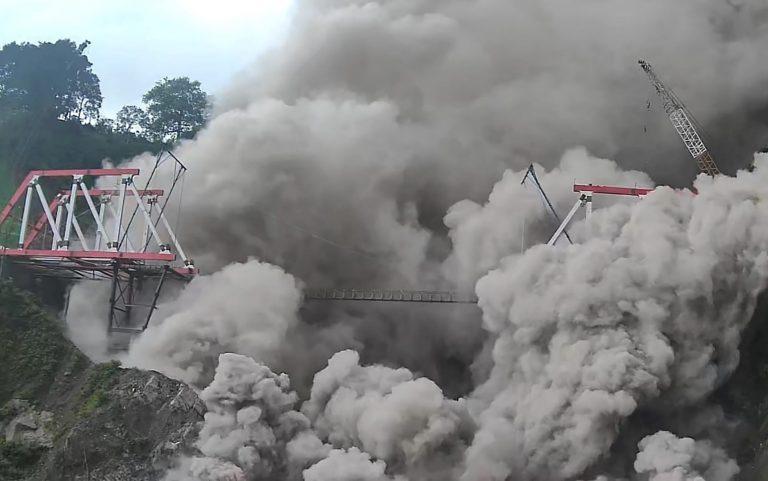Headline
Another Earthquake Hits Indonesia’s Java Island

A 5.8-magnitude earthquake hit Indonesia’s main island of Java on Thursday with no immediate reports of damage, less than a month after another quake in the same province killed more than 300 people.
The quake struck at 07:50 am local time (0050 GMT) around 15 kilometres from the town of Cianjur, epicentre of November’s devastating tremor, the United States Geological Survey said.
It said there was a low likelihood of casualties or damage following the quake, which struck at a depth of 123 kilometres (76 miles).
No damage was immediately reported in Cianjur or Sukabumi, the city nearest the epicentre, local disaster mitigation agency officials said Thursday.
But schools were temporarily evacuated in Sukabumi, according to local TV.
“The epicentre of the earthquake is in Sukabumi, so it was only lightly felt in Cianjur. No reports of damage to houses or casualties,” said Wawan Setawan, a disaster agency official in Cianjur told AFP.
“We have yet to receive reports of damage caused by the earthquake”, an official in Sukabumi, Imran Wardhani, said soon after the tremor.
5.6-magnitude earthquake hit Cianjur, triggering landslides and collapsing buildings, killing at least 334 people, injuring thousands and leaving tens of thousands more homeless.
READ ALSO: Moscow Blames Ukraine For Blasts On Russian Airfields
Save the Children warned this week that evacuees faced a “ticking time bomb” of disease and infection due to poor living conditions. Thousands of cases of respiratory infections and hundreds of cases of diarrhoea have been reported.
Indonesian President Joko Widodo is visiting the area on Thursday to distribute aid to affected residents.
The tremor that struck Cinajur on November 21 was the deadliest in the archipelago nation since a 2018 quake and resulting tsunami killed more than 4,000 people on the island of Sulawesi.
Indonesia experiences frequent seismic and volcanic activity due to its position on the Pacific “Ring of Fire”, where tectonic plates collide.
AFP
Headline
Aircraft Crashes In Owerri With Four Persons Onboard

A Cessna 172 aircraft with registration number 5N-ASR, operated by Skypower Express, has crashed at the Sam Mbakwe International Cargo Airport, Owerri, Imo State.
The aircraft had departed Kaduna International Airport en route to Port Harcourt International Airport before diverting to Owerri after the crew declared an emergency.
The crash occurred at about 8:00 pm on the airport premises, with four passengers and crew members onboard.
Confirming the incident, the Director, Public Affairs and Family Assistance of the Nigerian Safety Investigation Bureau (NSIB), Mrs. Bimbo Oladeji, said the agency had been notified of the crash.
READ ALSO:Social Media Feud Spills Into Aircraft As VDM, Mr Jollof Exchange Blows
According to the NSIB, the aircraft crashed on the approach area of Runway 17, but no fatalities have been recorded so far.
The statement said: “Following the occurrence, airport emergency services were successfully activated and arrived on site promptly. Reports indicate that there was no post-crash fire, and the runway remains active for flight operations, with other aircraft taking off safely after the incident.
“Efforts are currently underway to coordinate the recovery and evacuation of the distressed aircraft from the crash site to allow for a detailed wreckage examination.”
The NSIB said it has officially activated its investigation protocols in line with its statutory mandate
READ ALSO:Ogun To Prosecute DJ Over Multiple Road Crashes
The Director-General of NSIB, Capt. Alex Badeh Jr., sympathised with the management of Skypower Express over the incident and expressed relief that no lives were lost.
Badeh Jr. added that the Bureau’s investigation team is already coordinating with relevant authorities to secure the crash site and commence a detailed investigation into the cause of the accident.
Two days ago, 11 persons narrowly escaped death as a private jet crash-landed at Mallam Aminu Kano International Airport, Kano, on Sunday morning.
The occupants, including passengers and cabin crew, were safely evacuated amid an intense atmosphere, eyewitnesses told The Guardian.
READ ALSO:Tanker Crash Kills Three, Fire Razes Shops In Kano
The private jet, owned by Flybird Aviation, crash-landed at about 9:30 a.m. while approaching Kano Airport en route to Abuja.
The incident attracted urgent attention, with emergency staff and other stakeholders converging at the runway to render rescue operations.
The management of the Federal Airports Authority of Nigeria (FAAN) is yet to release an official statement on the incident. Unofficial sources disclosed that the passengers have been taken to an unknown destination.
Several aircraft incidents have occurred at Kano Airport, with several lives lost.
The last incident occurred in May 2002, when an EAS Airline aircraft departed the runway at Aminu Kano International Airport at 1:29 p.m. local time en route to Lagos.
Headline
Musk Breaks Record As First Person Worth Over $600 Billion

Elon Musk, Chief Executive Officer of SpaceX, Tesla, and xAI, has reached a new personal wealth milestone, surpassing a net worth of $600 billion, driven primarily by a recent valuation increase of SpaceX.
The development makes Musk the first individual in history to exceed the US$600 billion threshold.
According to Bloomberg’s Billionaires Index, Musk’s net worth stood at approximately $638 billion as of 15 December 2025, with the increase largely attributed to SpaceX, which was recently valued at around $800 billion following an insider share sale.
The privately held aerospace company, based in Starbase, Texas, is now considered the most valuable private firm globally, significantly boosting Musk’s personal holdings.
READ ALSO:Elon Musk Joins ‘Cancel Netflix’ Campaign
Musk’s stake in Tesla, estimated at roughly 12 per cent, is valued at nearly $200 billion, while his majority ownership of xAI Holdings is estimated at $60 billion.
Collectively, these assets place him on track to potentially approach US$700 billion, widening the gap between him and the world’s second-richest individual, former Google CEO Larry Page, valued at $265 billion.
The SpaceX valuation comes ahead of a projected public listing in 2026, which could see the company valued at approximately $1.5 trillion.
“Other shareholder meetings are snooze-fests but ours are bangers. Look at this. This is sick,” Musk said in November during Tesla’s shareholder meeting, referring to a performance-linked pay package approved by investors.
READ ALSO:EU Fines Elon Musk’s X €120m For Violating Digital Content Rules
He added, “I super appreciate it.” The package, potentially worth up to US$1 trillion in stock, is tied to market-capitalisation and operational milestones over the next decade.
SpaceX’s Starlink satellite network has also contributed to investor confidence. The company continues to expand high-speed internet access to underserved regions worldwide.
Chad Gibbs, Vice President of Starlink Operations, stated that the satellite technology “bypasses the need to build massive amounts of infrastructure,” allowing broader and faster connectivity.
Musk’s ascent in personal wealth follows years of strategic risk-taking and long-term planning, with Tesla’s focus on electric vehicles, battery technology, and autonomous systems laying the foundation for his financial growth.
Analysts note that the combination of SpaceX’s soaring valuation, Tesla’s long-term incentives, and Musk’s diverse portfolio underpins his current status as the world’s wealthiest individual.
Headline
South Korea, Japan Protest China, Russia Aircraft Incursions

South Korea and Japan reacted furiously on Wednesday after Chinese and Russian military aircraft conducted joint patrols around the two countries, with both Seoul and Tokyo scrambling jets.
South Korea said it had protested with representatives of China and Russia, while Japan said it had conveyed its “serious concerns” over national security.
According to Tokyo, two Russian Tu-95 nuclear-capable bombers on Tuesday flew from the Sea of Japan to rendezvous with two Chinese H-6 bombers in the East China Sea, then conducted a joint flight around the country.
The incident comes as Japan is locked in a dispute with China over comments Prime Minister Sanae Takaichi made about Taiwan.
READ ALSO:China Backs Nigeria, Warns Against Foreign Interference
The bombers’ joint flights were “clearly intended as a show of force against our nation, Defence Minister Shinjiro Koizumi wrote on X Wednesday.
Top government spokesman Minoru Kihara said that Tokyo had “conveyed to both China and Russia our serious concerns over our national security through diplomatic channels”.
Seoul said Tuesday the Russian and Chinese warplanes entered its air defence zone and that a complaint had been lodged with the defence attaches of both countries in the South Korean capital.
“Our military will continue to respond actively to the activities of neighbouring countries’ aircraft within the KADIZ in compliance with international law,” said Lee Kwang-suk, director general of the International Policy Bureau at Seoul’s defence ministry, referring to the Korea Air Defence Identification Zone.
READ ALSO:Trial For South Korean Woman Accused Of ‘Suitcase Murders’ Starts Today
South Korea also said it deployed “fighter jets to take tactical measures in preparation for any contingencies” in response to the Chinese and Russian incursion into the KADIZ.
The planes were spotted before they entered the air defence identification zone, defined as a broader area in which countries police aircraft for security reasons but which does not constitute their airspace.
Japan’s defence ministry also scrambled fighter jets to intercept the warplanes.
Beijing later Tuesday confirmed it had organised drills with Russia’s military according to “annual cooperation plans”.
READ ALSO:South Korean Actress Kim Sae-ron Found Dead In Seoul Apartment
Moscow also described it as a routine exercise, saying it lasted eight hours and that some foreign fighter jets followed the Russian and Chinese aircraft.
Since 2019, China and Russia have regularly flown military aircraft into South Korea’s air defence zone without prior notice, citing joint exercises.
In November last year, Seoul scrambled jets as five Chinese and six Russian military planes flew through its air defence zone.
Similar incidents occurred in June and December 2023, and in May and November 2022.
READ ALSO:Russia Insists Ukraine Must Cede Land Or Face Continued Military Push
Meanwhile, Tokyo said Monday it had scrambled jets in response to repeated takeoff and landing exercises involving fighter jets and military helicopters from China’s Liaoning aircraft carrier as it cruised in international waters near Japan.
It also summoned Beijing’s ambassador after military aircraft from the Liaoning locked radar onto Japanese jets, the latest incident in the row ignited by Takaichi’s comments backing Taiwan.
Takaichi suggested last month that Japan would intervene militarily in any Chinese attack on the self-ruled island, which Beijing claims as its own and has not ruled out seizing by force.
AFP

 Metro3 days ago
Metro3 days agoSuspected Kidnappers Abduct 18 Passengers On Benin-Akure Road

 News3 days ago
News3 days agoI’m Not Distracted By Anti-Niger Delta Elements, Says PAP Boss, Otuaro

 Sports2 days ago
Sports2 days agoJUST IN: Dembélé Named FIFA Best Men’s Player, Bonmatí Wins Women’s Award

 News3 days ago
News3 days agoEdo Assembly Charges Contractor Handling Ekekhuan Road To Accelerate Work

 News3 days ago
News3 days agoOPINION: Time For The Abachas To Rejoice

 Metro3 days ago
Metro3 days agoNDLEA Seizes 457kg of Cannabis, Arrests Suspected Trafficker In Edo

 News2 days ago
News2 days agoWage Dispute: Court Orders PSG To Pay Mbappe €61 Million

 Business2 days ago
Business2 days agoCBN Revokes Licences Of Aso Savings, Union Homes As NDIC Begins Deposit Payments

 News2 days ago
News2 days agoOPINION: Man-of-the-people, Man-of-himself

 Headline2 days ago
Headline2 days agoAircraft Crashes In Owerri With Four Persons Onboard




















